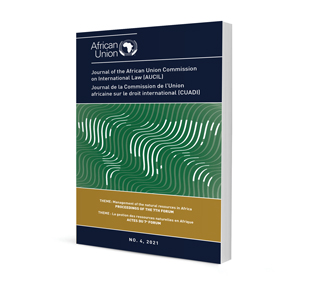Abstract
In 1962, newly independent African states voted overwhelming in support of United Nations (UN) General Assembly Resolution 1803 (XVII) on ‘Permanent Sovereignty over Natural Resources’ (PSNR). This resolution emerged mainly in response to concerns about the protection of foreign direct investment (FDI) and economic development in developing countries. Although substantial legal scholarship has focused on PSNR, few studies have focused on conceptualising PSNR and investor-state dispute settlement (ISDS) in Africa. This paper intends to fill this important research gap, by conceptualising PSNR as a threepronged principle that protects the rights of the state, investors and citizens. This paper examines the evolution of PSNR in the context of investment law in Africa through a textual analysis of treaty language in African investment treaties and as interpreted in natural resource-related investor-state disputes. This paper also examines the significance of Tanzania’s recently enacted Natural Wealth and Resources (Permanent Sovereignty) Act, 2017 (Sovereignty Act). The paper’s textual analysis reveals that unlike what is envisaged under Resolution 1803, dispute settlement clauses in treaties signed by African states do not provide for the exhaustion of local remedies. This paper argues that to attain ‘sustainable sovereignty’ over natural resources, African states must recognise the core of foreign investment protection law: pacta sunt servanda. Although the ‘new generation’ treaties constitute positive steps, to fully attain transformed development through the sustainable use of natural resources (as envisaged in Agenda 2063) treaty reform must be backed by good governance, informed natural resource investment contracts, the rule of law, and intra-regional investment.
En 1962, les États africains nouvellement indépendants ont favorablement et massivement voté la Résolution 1803 (XVII) de l’Assemblée générale des Nations Unies (ONU), sur la « souveraineté permanente des ressources naturelles » (SPRN). Cette Résolution a été adoptée en réponse aux préoccupations concernant la protection des investissements directs étrangers (IDE) et le développement économique des pays en voie de développement. Bien que le SPRN ait fait l’objet d’importantes études juridiques, peu d’études ont porté sur la conceptualisation des SPRN et les accords sur les différends entre investisseurs et États (ADIE) en Afrique. Cet article vise à combler cet important vide dans la recherche en conceptualisant les SPRN comme un principe à trois volets qui protège les droits de l’État, des investisseurs et des citoyens. Cet article analyse l’évolution des SPRN dans le contexte du droit à l’investissement en Afrique par une analyse textuelle du langage des traités dans les traités d’investissement africains et tel qu’interprété dans les différends entre investisseurs et États en relation avec les ressources naturelles. Cet article examine également l’importance de la récente promulgation en Tanzanie de la loi sur les Richesses et Ressources Naturelles (Souveraineté Permanente) de 2017 (Loi sur la Souveraineté). L’analyse textuelle de cet article révèle que contrairement à ce qui est envisagé dans la Résolution 1803, les clauses de règlement des différends contenues dans les traités signés par les États africains ne prévoient pas l’épuisement des recours internes. Cet article soutient que pour parvenir à la « souveraineté durable » sur les ressources naturelles, les États africains doivent reconnaître l’essence de la loi sur la protection des investissements étrangers : pacta sunt servanda. Bien que les traités de la « nouvelle génération » constituent des étapes positives pour parvenir à un développement pleinement transformé grâce à l’utilisation durable des ressources naturelles (comme prévu dans l’Agenda 2063), la réforme des traités doit être soutenue par une bonne gouvernance, des contrats réfléchis relatifs aux ressources naturelles, l’État de droit et les investissements intra régionaux.

